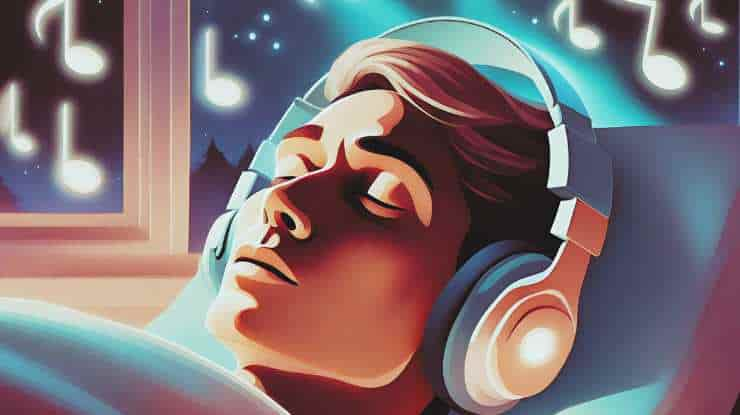Sleep is an all too vital part of a healthy lifestyle. One 2013 study looked at the relationship between sleep duration and health in Korean adults1.
The results showed that poor sleep of 5 hours or less per day and long sleep duration of 9 hours or more per day was associated with poor self-rated health. This just one of many studies emphasizing the importance of adequate sleep in physical and mental health.
Bottom line? You’ll feel frustrated and lethargic when you don’t get enough rest.
It can turn into a big problem if you don’t find a way to combat it.
There are a variety of strategies you can use to help you go to sleep. People use a warm glass of milk, counting sheep, or reading, but sometimes, these remedies don’t work.
Music, however, may be the solution you’ve been looking for to help you with your sleepless nights. The right type of music can help you relax, while the silence around you might invite your mind to wander in worry.
As one example of how powerful music is, recently, researchers have discovered that the subjective and physiological responses to how exciting or calming people found the music to be appeared to be universal across widely different cultures.2
The researchers played 19 short musical extracts of between about 30 and 90 seconds to forty Mbenzélé Pygmies in the Congo and then to forty Canadians in Montreal.
Postdoctoral fellow Hauke Egermann said:
Our major discovery is that listeners from very different groups both responded to how exciting or calming they felt the music to be in similar ways. This is probably due to certain low-level aspects of music such as tempo (or beat), pitch (how high or low the music is on the scale) and timbre (tone colour or quality), but this will need further research.
The 11 pieces of music from Western culture was designed to induce a range of emotions from calm to excited and from happy to anxious or sad, and included both orchestral music and excerpts from three popular films (Psycho, Star Wars, and Schindler’s List).
The 8 Pygmy pieces were all polyphonic vocal pieces that are fairly upbeat and tend to be performed in ceremonial contexts to calm anger, or express comfort after a death, for example, or to bid good fortune before a hunting expedition leaves the village, or even to pacify a crying child.
How to use Music to get a Peaceful Night’s Sleep
1. Softer music at a low volume is best. Mellow, sweet music can relax your mind and body. If the tempo is too fast or the volume is too loud, however, you’ll toss and turn amidst the noise. The transition to sleep can be made much easier with soft background music that blends into the surroundings.
• Down-tempo artists like The Cure, Tom Waits, and Nick Drake make great sleeping music. Put the stereo on repeat or set up a playlist on your computer that will play the music you select throughout the night. That way, if you do wake up, you can fall right back to sleep easily.
• Acoustic versions of songs can also calm your mind and help you drift off to sleep.
• If you like a bit of variety in your sleeping playlist, movie soundtracks make excellent choices.
• Classical music is an often overlooked but effective, sleep aid.
2. Music helps pass the time. One of the temptations of insomnia is to get up and do something to take your mind off the fact that you can’t sleep. Often, this wakes you up instead of calming you to sleep. Instead of lying in bed and feeling bored, play music to take your mind to a different and more pleasant place. In no time, you’ll be sound asleep.
3. Music melts away stress. Your insomnia may be caused by worry and anxiety. If something on your mind is keeping you awake, music will keep your mind distracted until you’re able to drift off to sleep.
• Music has the ability to alter your mood. Soothing music can calm you down when you’re angry, afraid, or upset.
One Downside to Music as a Sleep Aid
Once you get used to falling asleep to music, you’ll experience more restful nights and productive days. As a result, you become accustomed to this new pattern of falling asleep.
Sometimes, however, you may find yourself in a position where you can’t listen to your favourite tunes as you drift off into dreamland.
Also, you may find it difficult to fall asleep without the music you’ve become accustomed to if you’re sleeping in unfamiliar surroundings. One solution is to hum your nighttime tunes as you lay down. Sometimes, simply listening to the music in your head can do the trick.
Music is inexpensive, has no side effects, and is surprisingly effective at helping with insomnia. Tonight, you can rest easy and wake up refreshed in the morning by falling asleep to the soft, sweet sounds that bring you the peace you crave.
References:
- Jae-Hyun Kim, Kyung Ran Kim, Kyoung Hee Cho, Ki-Bong Yoo, Jeoung A. Kwon, Eun-Cheol Park.
The Association between Sleep Duration and Self-Rated Health in the Korean General Population.
Journal of Clinical Sleep Medicine, 2013; DOI:10.5664/jcsm.3082 - Hauke Egermann, Nathalie Fernando, Lorraine Chuen and Stephen Mcadams.
Music induces universal emotion-related psychophysiological responses: comparing Canadian listeners to Congolese Pygmies.
Frontiers in Psychology, January 2015 DOI: 10.3389/fpsyg.2014.01341
Last Updated on October 13, 2023
